Eden Project: Cultural Dimensions Impact on Marketing Mix for China
VerifiedAdded on 2020/06/03
|11
|3934
|46
Report
AI Summary
This report analyzes the Eden Project's potential expansion into China by examining the differences in consumer behavior between Chinese and British cultures, utilizing Hofstede's cultural dimensions model. The analysis covers key dimensions such as power distance, individualism vs. collectivism, masculinity, uncertainty avoidance, and long-term orientation to highlight how these cultural values impact consumer preferences and purchasing behaviors. The report then evaluates the implications of these cultural differences for the Eden Project's marketing mix, including product design, pricing strategies, and promotional activities. It emphasizes the importance of adapting the marketing approach to align with the collectivist nature, high power distance, and other cultural nuances of Chinese consumers to enhance service encounters and achieve marketing objectives. The report provides recommendations for tailoring the Eden Project's offerings and communication strategies to resonate with the target audience in China, ensuring the project's success in the new market. Finally, the report suggests necessary changes in the marketing mix elements such as product, price, place and promotion.

The Eden Project - Briefing
Document
Document
Paraphrase This Document
Need a fresh take? Get an instant paraphrase of this document with our AI Paraphraser
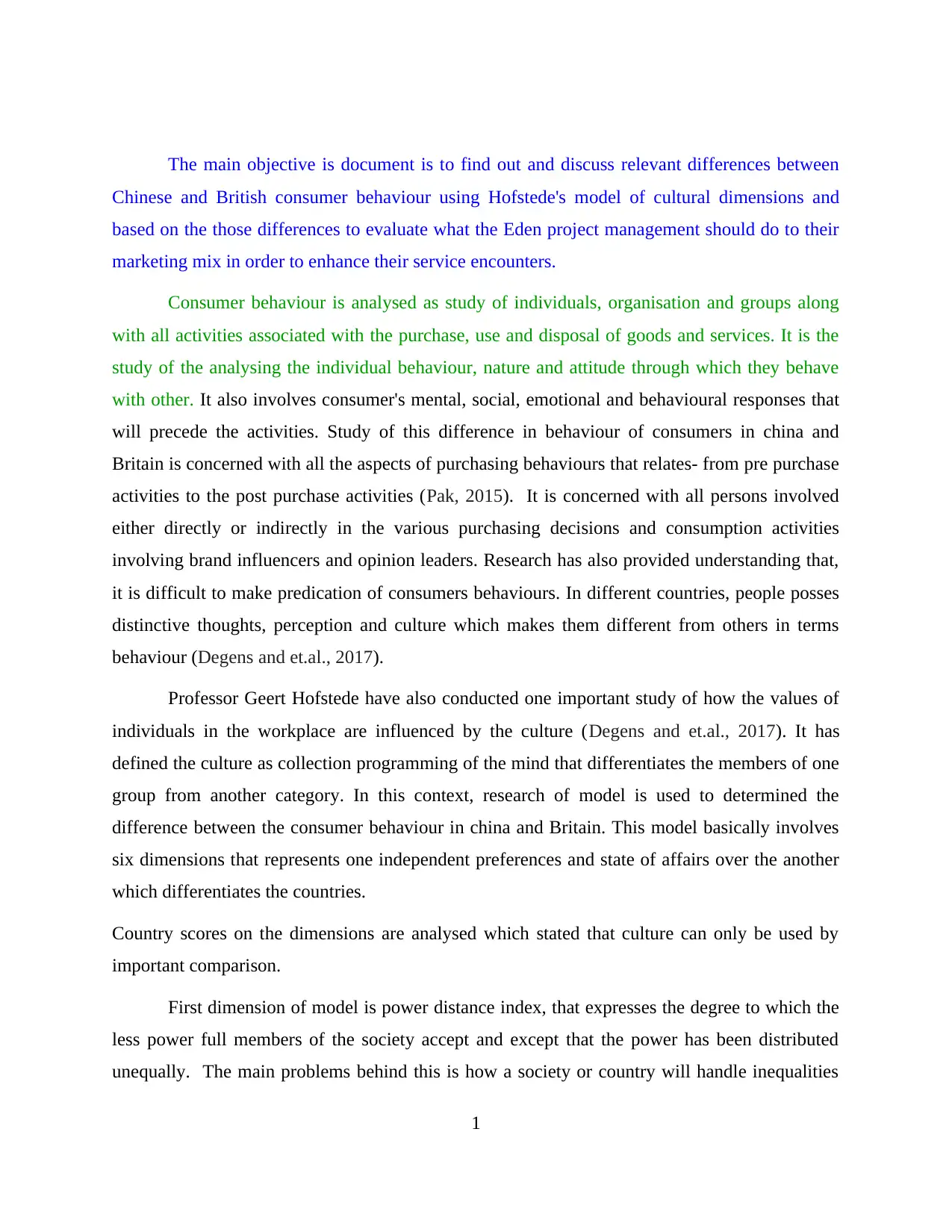
The main objective is document is to find out and discuss relevant differences between
Chinese and British consumer behaviour using Hofstede's model of cultural dimensions and
based on the those differences to evaluate what the Eden project management should do to their
marketing mix in order to enhance their service encounters.
Consumer behaviour is analysed as study of individuals, organisation and groups along
with all activities associated with the purchase, use and disposal of goods and services. It is the
study of the analysing the individual behaviour, nature and attitude through which they behave
with other. It also involves consumer's mental, social, emotional and behavioural responses that
will precede the activities. Study of this difference in behaviour of consumers in china and
Britain is concerned with all the aspects of purchasing behaviours that relates- from pre purchase
activities to the post purchase activities (Pak, 2015). It is concerned with all persons involved
either directly or indirectly in the various purchasing decisions and consumption activities
involving brand influencers and opinion leaders. Research has also provided understanding that,
it is difficult to make predication of consumers behaviours. In different countries, people posses
distinctive thoughts, perception and culture which makes them different from others in terms
behaviour (Degens and et.al., 2017).
Professor Geert Hofstede have also conducted one important study of how the values of
individuals in the workplace are influenced by the culture (Degens and et.al., 2017). It has
defined the culture as collection programming of the mind that differentiates the members of one
group from another category. In this context, research of model is used to determined the
difference between the consumer behaviour in china and Britain. This model basically involves
six dimensions that represents one independent preferences and state of affairs over the another
which differentiates the countries.
Country scores on the dimensions are analysed which stated that culture can only be used by
important comparison.
First dimension of model is power distance index, that expresses the degree to which the
less power full members of the society accept and except that the power has been distributed
unequally. The main problems behind this is how a society or country will handle inequalities
1
Chinese and British consumer behaviour using Hofstede's model of cultural dimensions and
based on the those differences to evaluate what the Eden project management should do to their
marketing mix in order to enhance their service encounters.
Consumer behaviour is analysed as study of individuals, organisation and groups along
with all activities associated with the purchase, use and disposal of goods and services. It is the
study of the analysing the individual behaviour, nature and attitude through which they behave
with other. It also involves consumer's mental, social, emotional and behavioural responses that
will precede the activities. Study of this difference in behaviour of consumers in china and
Britain is concerned with all the aspects of purchasing behaviours that relates- from pre purchase
activities to the post purchase activities (Pak, 2015). It is concerned with all persons involved
either directly or indirectly in the various purchasing decisions and consumption activities
involving brand influencers and opinion leaders. Research has also provided understanding that,
it is difficult to make predication of consumers behaviours. In different countries, people posses
distinctive thoughts, perception and culture which makes them different from others in terms
behaviour (Degens and et.al., 2017).
Professor Geert Hofstede have also conducted one important study of how the values of
individuals in the workplace are influenced by the culture (Degens and et.al., 2017). It has
defined the culture as collection programming of the mind that differentiates the members of one
group from another category. In this context, research of model is used to determined the
difference between the consumer behaviour in china and Britain. This model basically involves
six dimensions that represents one independent preferences and state of affairs over the another
which differentiates the countries.
Country scores on the dimensions are analysed which stated that culture can only be used by
important comparison.
First dimension of model is power distance index, that expresses the degree to which the
less power full members of the society accept and except that the power has been distributed
unequally. The main problems behind this is how a society or country will handle inequalities
1
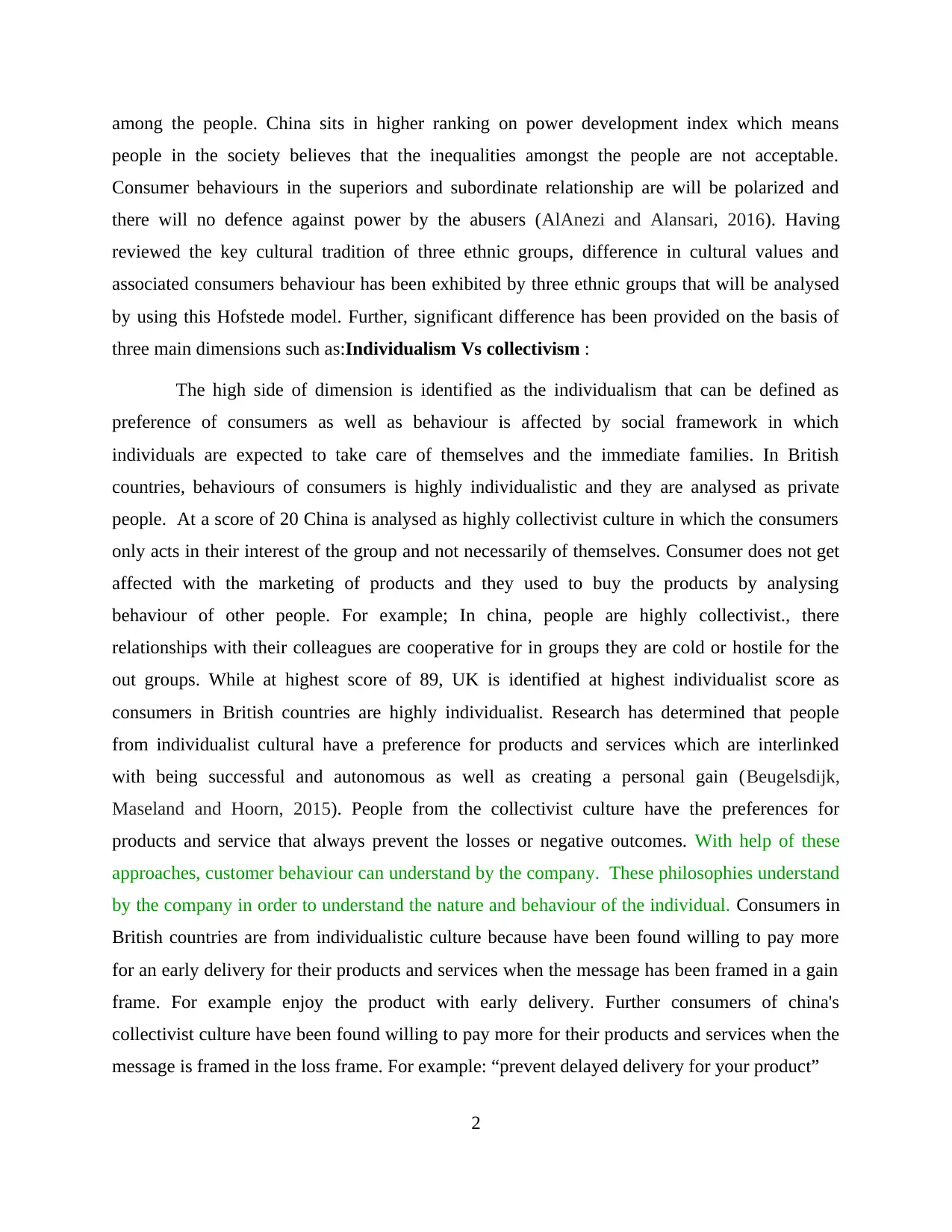
among the people. China sits in higher ranking on power development index which means
people in the society believes that the inequalities amongst the people are not acceptable.
Consumer behaviours in the superiors and subordinate relationship are will be polarized and
there will no defence against power by the abusers (AlAnezi and Alansari, 2016). Having
reviewed the key cultural tradition of three ethnic groups, difference in cultural values and
associated consumers behaviour has been exhibited by three ethnic groups that will be analysed
by using this Hofstede model. Further, significant difference has been provided on the basis of
three main dimensions such as:Individualism Vs collectivism :
The high side of dimension is identified as the individualism that can be defined as
preference of consumers as well as behaviour is affected by social framework in which
individuals are expected to take care of themselves and the immediate families. In British
countries, behaviours of consumers is highly individualistic and they are analysed as private
people. At a score of 20 China is analysed as highly collectivist culture in which the consumers
only acts in their interest of the group and not necessarily of themselves. Consumer does not get
affected with the marketing of products and they used to buy the products by analysing
behaviour of other people. For example; In china, people are highly collectivist., there
relationships with their colleagues are cooperative for in groups they are cold or hostile for the
out groups. While at highest score of 89, UK is identified at highest individualist score as
consumers in British countries are highly individualist. Research has determined that people
from individualist cultural have a preference for products and services which are interlinked
with being successful and autonomous as well as creating a personal gain (Beugelsdijk,
Maseland and Hoorn, 2015). People from the collectivist culture have the preferences for
products and service that always prevent the losses or negative outcomes. With help of these
approaches, customer behaviour can understand by the company. These philosophies understand
by the company in order to understand the nature and behaviour of the individual. Consumers in
British countries are from individualistic culture because have been found willing to pay more
for an early delivery for their products and services when the message has been framed in a gain
frame. For example enjoy the product with early delivery. Further consumers of china's
collectivist culture have been found willing to pay more for their products and services when the
message is framed in the loss frame. For example: “prevent delayed delivery for your product”
2
people in the society believes that the inequalities amongst the people are not acceptable.
Consumer behaviours in the superiors and subordinate relationship are will be polarized and
there will no defence against power by the abusers (AlAnezi and Alansari, 2016). Having
reviewed the key cultural tradition of three ethnic groups, difference in cultural values and
associated consumers behaviour has been exhibited by three ethnic groups that will be analysed
by using this Hofstede model. Further, significant difference has been provided on the basis of
three main dimensions such as:Individualism Vs collectivism :
The high side of dimension is identified as the individualism that can be defined as
preference of consumers as well as behaviour is affected by social framework in which
individuals are expected to take care of themselves and the immediate families. In British
countries, behaviours of consumers is highly individualistic and they are analysed as private
people. At a score of 20 China is analysed as highly collectivist culture in which the consumers
only acts in their interest of the group and not necessarily of themselves. Consumer does not get
affected with the marketing of products and they used to buy the products by analysing
behaviour of other people. For example; In china, people are highly collectivist., there
relationships with their colleagues are cooperative for in groups they are cold or hostile for the
out groups. While at highest score of 89, UK is identified at highest individualist score as
consumers in British countries are highly individualist. Research has determined that people
from individualist cultural have a preference for products and services which are interlinked
with being successful and autonomous as well as creating a personal gain (Beugelsdijk,
Maseland and Hoorn, 2015). People from the collectivist culture have the preferences for
products and service that always prevent the losses or negative outcomes. With help of these
approaches, customer behaviour can understand by the company. These philosophies understand
by the company in order to understand the nature and behaviour of the individual. Consumers in
British countries are from individualistic culture because have been found willing to pay more
for an early delivery for their products and services when the message has been framed in a gain
frame. For example enjoy the product with early delivery. Further consumers of china's
collectivist culture have been found willing to pay more for their products and services when the
message is framed in the loss frame. For example: “prevent delayed delivery for your product”
2
⊘ This is a preview!⊘
Do you want full access?
Subscribe today to unlock all pages.

Trusted by 1+ million students worldwide
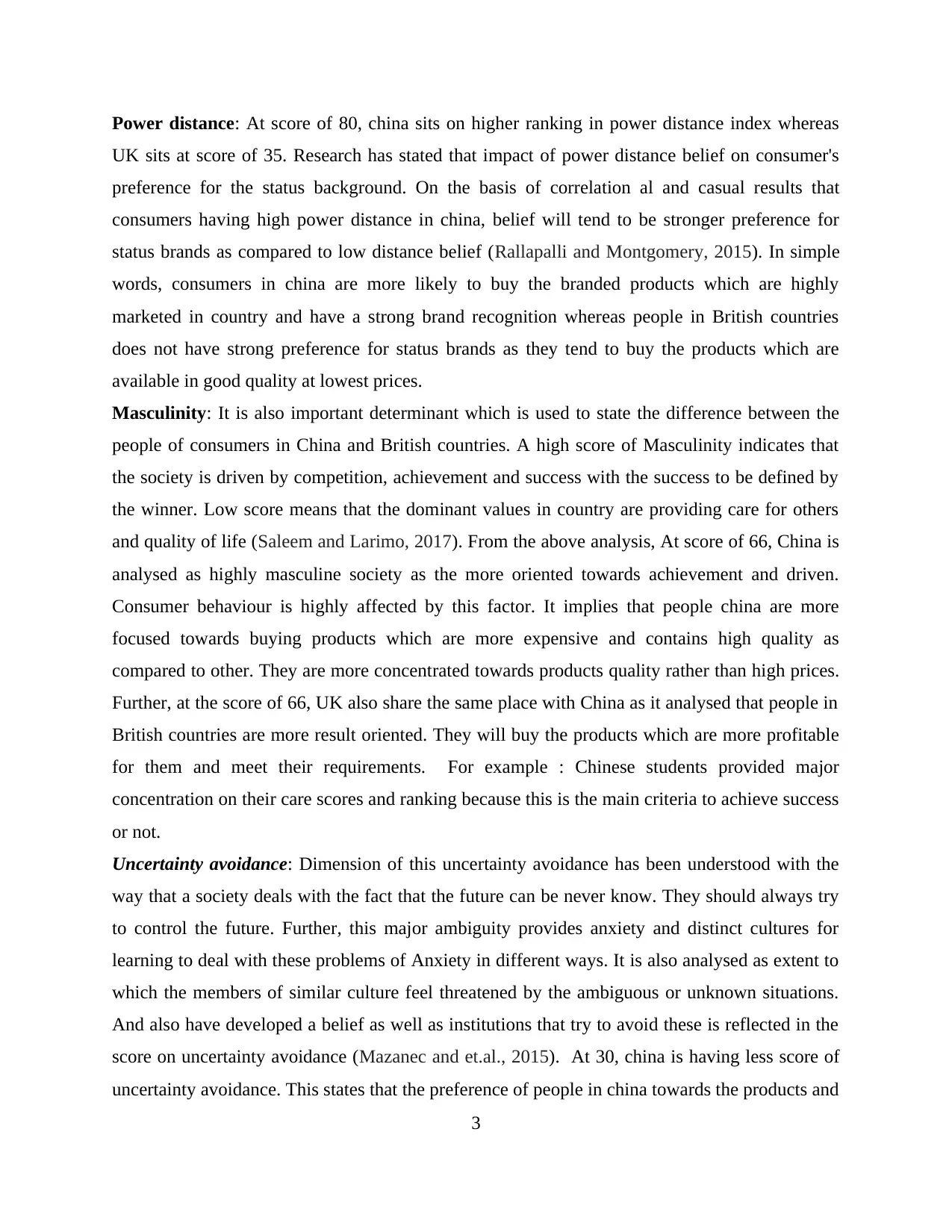
Power distance: At score of 80, china sits on higher ranking in power distance index whereas
UK sits at score of 35. Research has stated that impact of power distance belief on consumer's
preference for the status background. On the basis of correlation al and casual results that
consumers having high power distance in china, belief will tend to be stronger preference for
status brands as compared to low distance belief (Rallapalli and Montgomery, 2015). In simple
words, consumers in china are more likely to buy the branded products which are highly
marketed in country and have a strong brand recognition whereas people in British countries
does not have strong preference for status brands as they tend to buy the products which are
available in good quality at lowest prices.
Masculinity: It is also important determinant which is used to state the difference between the
people of consumers in China and British countries. A high score of Masculinity indicates that
the society is driven by competition, achievement and success with the success to be defined by
the winner. Low score means that the dominant values in country are providing care for others
and quality of life (Saleem and Larimo, 2017). From the above analysis, At score of 66, China is
analysed as highly masculine society as the more oriented towards achievement and driven.
Consumer behaviour is highly affected by this factor. It implies that people china are more
focused towards buying products which are more expensive and contains high quality as
compared to other. They are more concentrated towards products quality rather than high prices.
Further, at the score of 66, UK also share the same place with China as it analysed that people in
British countries are more result oriented. They will buy the products which are more profitable
for them and meet their requirements. For example : Chinese students provided major
concentration on their care scores and ranking because this is the main criteria to achieve success
or not.
Uncertainty avoidance: Dimension of this uncertainty avoidance has been understood with the
way that a society deals with the fact that the future can be never know. They should always try
to control the future. Further, this major ambiguity provides anxiety and distinct cultures for
learning to deal with these problems of Anxiety in different ways. It is also analysed as extent to
which the members of similar culture feel threatened by the ambiguous or unknown situations.
And also have developed a belief as well as institutions that try to avoid these is reflected in the
score on uncertainty avoidance (Mazanec and et.al., 2015). At 30, china is having less score of
uncertainty avoidance. This states that the preference of people in china towards the products and
3
UK sits at score of 35. Research has stated that impact of power distance belief on consumer's
preference for the status background. On the basis of correlation al and casual results that
consumers having high power distance in china, belief will tend to be stronger preference for
status brands as compared to low distance belief (Rallapalli and Montgomery, 2015). In simple
words, consumers in china are more likely to buy the branded products which are highly
marketed in country and have a strong brand recognition whereas people in British countries
does not have strong preference for status brands as they tend to buy the products which are
available in good quality at lowest prices.
Masculinity: It is also important determinant which is used to state the difference between the
people of consumers in China and British countries. A high score of Masculinity indicates that
the society is driven by competition, achievement and success with the success to be defined by
the winner. Low score means that the dominant values in country are providing care for others
and quality of life (Saleem and Larimo, 2017). From the above analysis, At score of 66, China is
analysed as highly masculine society as the more oriented towards achievement and driven.
Consumer behaviour is highly affected by this factor. It implies that people china are more
focused towards buying products which are more expensive and contains high quality as
compared to other. They are more concentrated towards products quality rather than high prices.
Further, at the score of 66, UK also share the same place with China as it analysed that people in
British countries are more result oriented. They will buy the products which are more profitable
for them and meet their requirements. For example : Chinese students provided major
concentration on their care scores and ranking because this is the main criteria to achieve success
or not.
Uncertainty avoidance: Dimension of this uncertainty avoidance has been understood with the
way that a society deals with the fact that the future can be never know. They should always try
to control the future. Further, this major ambiguity provides anxiety and distinct cultures for
learning to deal with these problems of Anxiety in different ways. It is also analysed as extent to
which the members of similar culture feel threatened by the ambiguous or unknown situations.
And also have developed a belief as well as institutions that try to avoid these is reflected in the
score on uncertainty avoidance (Mazanec and et.al., 2015). At 30, china is having less score of
uncertainty avoidance. This states that the preference of people in china towards the products and
3
Paraphrase This Document
Need a fresh take? Get an instant paraphrase of this document with our AI Paraphraser
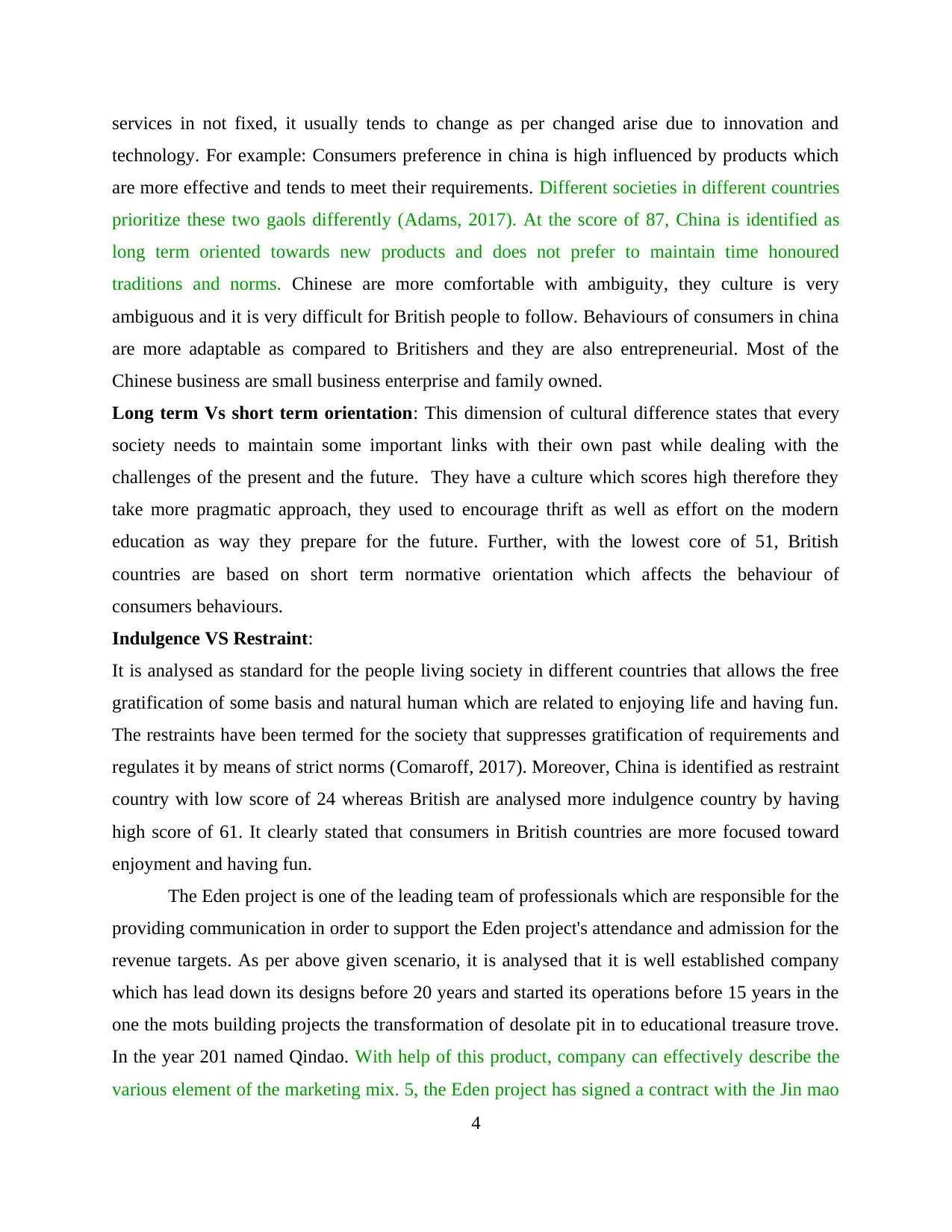
services in not fixed, it usually tends to change as per changed arise due to innovation and
technology. For example: Consumers preference in china is high influenced by products which
are more effective and tends to meet their requirements. Different societies in different countries
prioritize these two gaols differently (Adams, 2017). At the score of 87, China is identified as
long term oriented towards new products and does not prefer to maintain time honoured
traditions and norms. Chinese are more comfortable with ambiguity, they culture is very
ambiguous and it is very difficult for British people to follow. Behaviours of consumers in china
are more adaptable as compared to Britishers and they are also entrepreneurial. Most of the
Chinese business are small business enterprise and family owned.
Long term Vs short term orientation: This dimension of cultural difference states that every
society needs to maintain some important links with their own past while dealing with the
challenges of the present and the future. They have a culture which scores high therefore they
take more pragmatic approach, they used to encourage thrift as well as effort on the modern
education as way they prepare for the future. Further, with the lowest core of 51, British
countries are based on short term normative orientation which affects the behaviour of
consumers behaviours.
Indulgence VS Restraint:
It is analysed as standard for the people living society in different countries that allows the free
gratification of some basis and natural human which are related to enjoying life and having fun.
The restraints have been termed for the society that suppresses gratification of requirements and
regulates it by means of strict norms (Comaroff, 2017). Moreover, China is identified as restraint
country with low score of 24 whereas British are analysed more indulgence country by having
high score of 61. It clearly stated that consumers in British countries are more focused toward
enjoyment and having fun.
The Eden project is one of the leading team of professionals which are responsible for the
providing communication in order to support the Eden project's attendance and admission for the
revenue targets. As per above given scenario, it is analysed that it is well established company
which has lead down its designs before 20 years and started its operations before 15 years in the
one the mots building projects the transformation of desolate pit in to educational treasure trove.
In the year 201 named Qindao. With help of this product, company can effectively describe the
various element of the marketing mix. 5, the Eden project has signed a contract with the Jin mao
4
technology. For example: Consumers preference in china is high influenced by products which
are more effective and tends to meet their requirements. Different societies in different countries
prioritize these two gaols differently (Adams, 2017). At the score of 87, China is identified as
long term oriented towards new products and does not prefer to maintain time honoured
traditions and norms. Chinese are more comfortable with ambiguity, they culture is very
ambiguous and it is very difficult for British people to follow. Behaviours of consumers in china
are more adaptable as compared to Britishers and they are also entrepreneurial. Most of the
Chinese business are small business enterprise and family owned.
Long term Vs short term orientation: This dimension of cultural difference states that every
society needs to maintain some important links with their own past while dealing with the
challenges of the present and the future. They have a culture which scores high therefore they
take more pragmatic approach, they used to encourage thrift as well as effort on the modern
education as way they prepare for the future. Further, with the lowest core of 51, British
countries are based on short term normative orientation which affects the behaviour of
consumers behaviours.
Indulgence VS Restraint:
It is analysed as standard for the people living society in different countries that allows the free
gratification of some basis and natural human which are related to enjoying life and having fun.
The restraints have been termed for the society that suppresses gratification of requirements and
regulates it by means of strict norms (Comaroff, 2017). Moreover, China is identified as restraint
country with low score of 24 whereas British are analysed more indulgence country by having
high score of 61. It clearly stated that consumers in British countries are more focused toward
enjoyment and having fun.
The Eden project is one of the leading team of professionals which are responsible for the
providing communication in order to support the Eden project's attendance and admission for the
revenue targets. As per above given scenario, it is analysed that it is well established company
which has lead down its designs before 20 years and started its operations before 15 years in the
one the mots building projects the transformation of desolate pit in to educational treasure trove.
In the year 201 named Qindao. With help of this product, company can effectively describe the
various element of the marketing mix. 5, the Eden project has signed a contract with the Jin mao
4
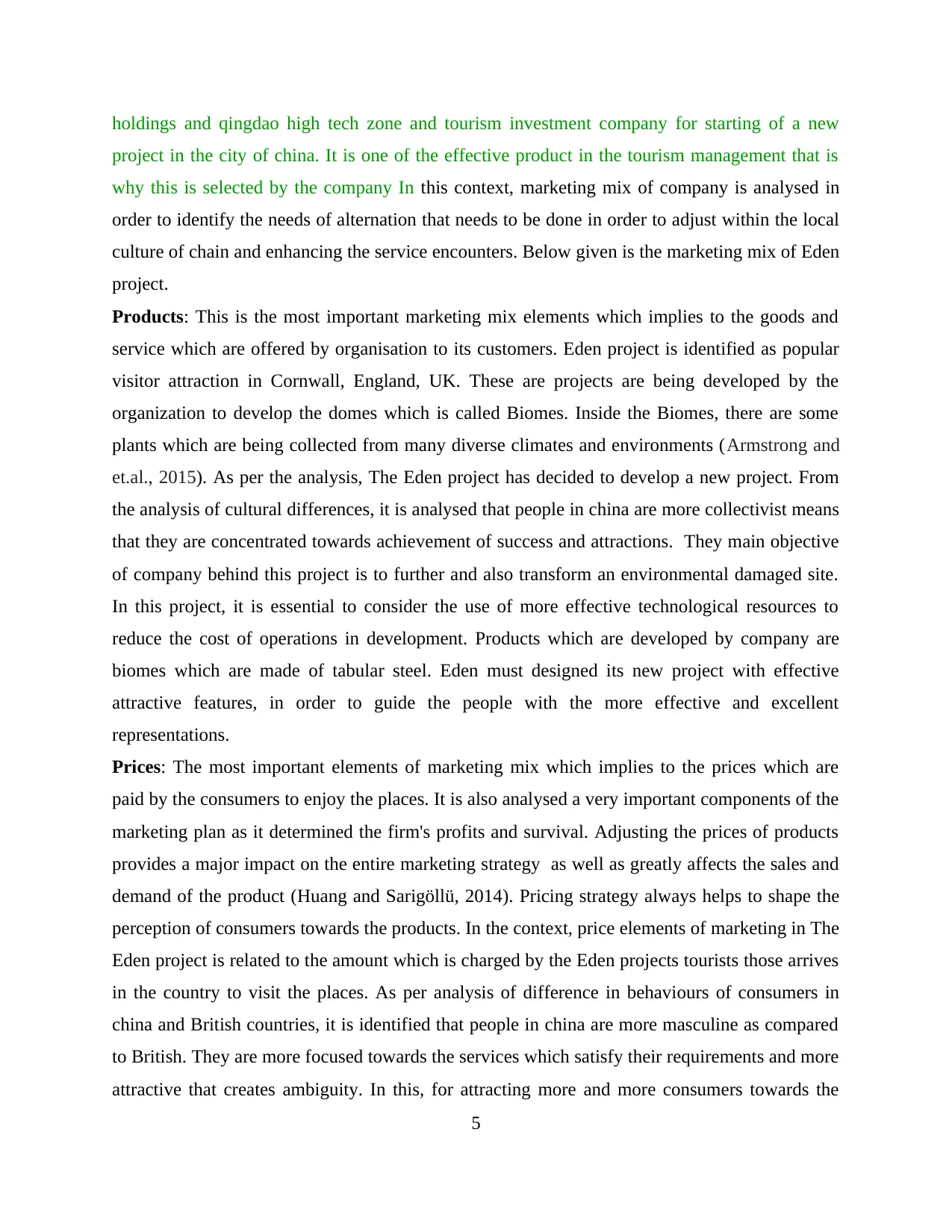
holdings and qingdao high tech zone and tourism investment company for starting of a new
project in the city of china. It is one of the effective product in the tourism management that is
why this is selected by the company In this context, marketing mix of company is analysed in
order to identify the needs of alternation that needs to be done in order to adjust within the local
culture of chain and enhancing the service encounters. Below given is the marketing mix of Eden
project.
Products: This is the most important marketing mix elements which implies to the goods and
service which are offered by organisation to its customers. Eden project is identified as popular
visitor attraction in Cornwall, England, UK. These are projects are being developed by the
organization to develop the domes which is called Biomes. Inside the Biomes, there are some
plants which are being collected from many diverse climates and environments (Armstrong and
et.al., 2015). As per the analysis, The Eden project has decided to develop a new project. From
the analysis of cultural differences, it is analysed that people in china are more collectivist means
that they are concentrated towards achievement of success and attractions. They main objective
of company behind this project is to further and also transform an environmental damaged site.
In this project, it is essential to consider the use of more effective technological resources to
reduce the cost of operations in development. Products which are developed by company are
biomes which are made of tabular steel. Eden must designed its new project with effective
attractive features, in order to guide the people with the more effective and excellent
representations.
Prices: The most important elements of marketing mix which implies to the prices which are
paid by the consumers to enjoy the places. It is also analysed a very important components of the
marketing plan as it determined the firm's profits and survival. Adjusting the prices of products
provides a major impact on the entire marketing strategy as well as greatly affects the sales and
demand of the product (Huang and Sarigöllü, 2014). Pricing strategy always helps to shape the
perception of consumers towards the products. In the context, price elements of marketing in The
Eden project is related to the amount which is charged by the Eden projects tourists those arrives
in the country to visit the places. As per analysis of difference in behaviours of consumers in
china and British countries, it is identified that people in china are more masculine as compared
to British. They are more focused towards the services which satisfy their requirements and more
attractive that creates ambiguity. In this, for attracting more and more consumers towards the
5
project in the city of china. It is one of the effective product in the tourism management that is
why this is selected by the company In this context, marketing mix of company is analysed in
order to identify the needs of alternation that needs to be done in order to adjust within the local
culture of chain and enhancing the service encounters. Below given is the marketing mix of Eden
project.
Products: This is the most important marketing mix elements which implies to the goods and
service which are offered by organisation to its customers. Eden project is identified as popular
visitor attraction in Cornwall, England, UK. These are projects are being developed by the
organization to develop the domes which is called Biomes. Inside the Biomes, there are some
plants which are being collected from many diverse climates and environments (Armstrong and
et.al., 2015). As per the analysis, The Eden project has decided to develop a new project. From
the analysis of cultural differences, it is analysed that people in china are more collectivist means
that they are concentrated towards achievement of success and attractions. They main objective
of company behind this project is to further and also transform an environmental damaged site.
In this project, it is essential to consider the use of more effective technological resources to
reduce the cost of operations in development. Products which are developed by company are
biomes which are made of tabular steel. Eden must designed its new project with effective
attractive features, in order to guide the people with the more effective and excellent
representations.
Prices: The most important elements of marketing mix which implies to the prices which are
paid by the consumers to enjoy the places. It is also analysed a very important components of the
marketing plan as it determined the firm's profits and survival. Adjusting the prices of products
provides a major impact on the entire marketing strategy as well as greatly affects the sales and
demand of the product (Huang and Sarigöllü, 2014). Pricing strategy always helps to shape the
perception of consumers towards the products. In the context, price elements of marketing in The
Eden project is related to the amount which is charged by the Eden projects tourists those arrives
in the country to visit the places. As per analysis of difference in behaviours of consumers in
china and British countries, it is identified that people in china are more masculine as compared
to British. They are more focused towards the services which satisfy their requirements and more
attractive that creates ambiguity. In this, for attracting more and more consumers towards the
5
⊘ This is a preview!⊘
Do you want full access?
Subscribe today to unlock all pages.

Trusted by 1+ million students worldwide
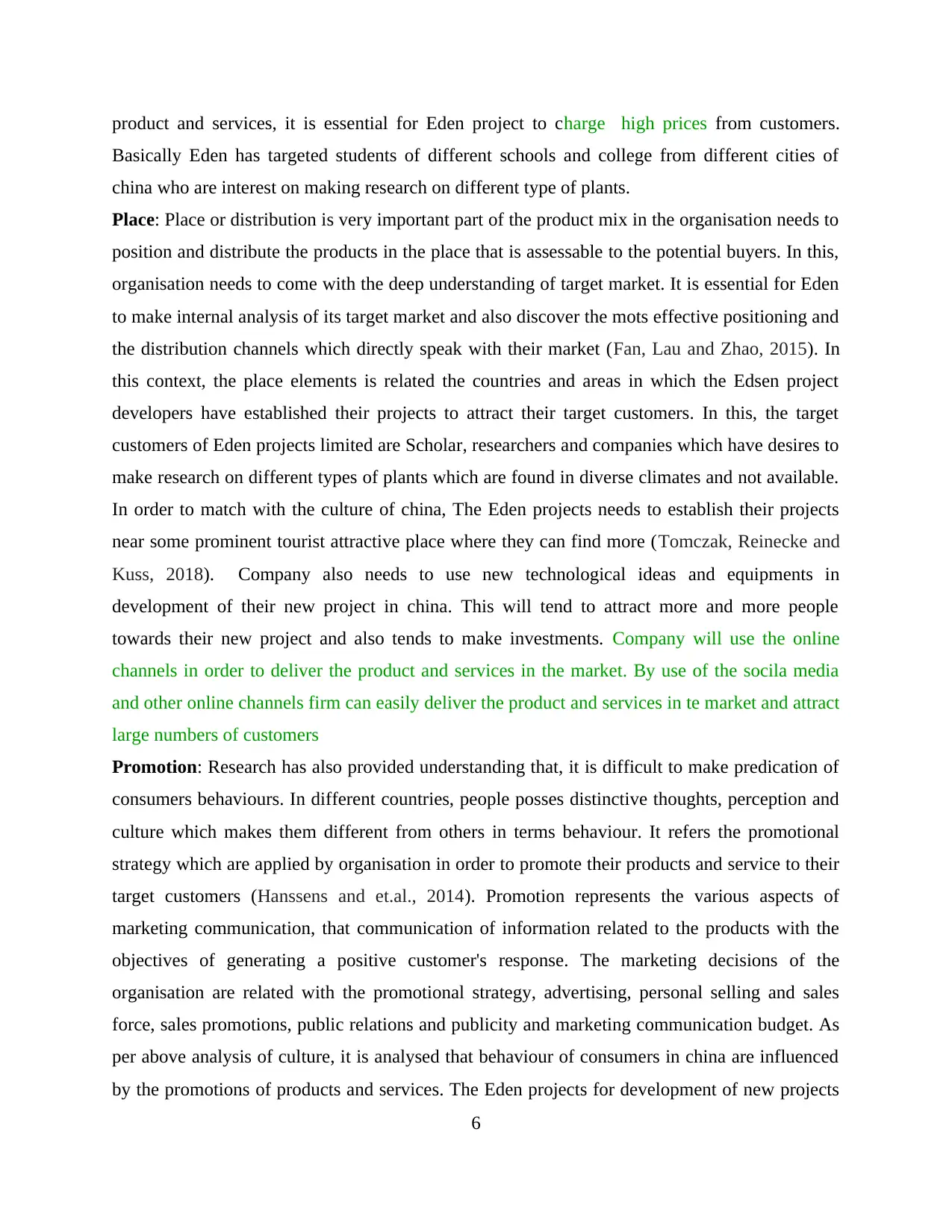
product and services, it is essential for Eden project to charge high prices from customers.
Basically Eden has targeted students of different schools and college from different cities of
china who are interest on making research on different type of plants.
Place: Place or distribution is very important part of the product mix in the organisation needs to
position and distribute the products in the place that is assessable to the potential buyers. In this,
organisation needs to come with the deep understanding of target market. It is essential for Eden
to make internal analysis of its target market and also discover the mots effective positioning and
the distribution channels which directly speak with their market (Fan, Lau and Zhao, 2015). In
this context, the place elements is related the countries and areas in which the Edsen project
developers have established their projects to attract their target customers. In this, the target
customers of Eden projects limited are Scholar, researchers and companies which have desires to
make research on different types of plants which are found in diverse climates and not available.
In order to match with the culture of china, The Eden projects needs to establish their projects
near some prominent tourist attractive place where they can find more (Tomczak, Reinecke and
Kuss, 2018). Company also needs to use new technological ideas and equipments in
development of their new project in china. This will tend to attract more and more people
towards their new project and also tends to make investments. Company will use the online
channels in order to deliver the product and services in the market. By use of the socila media
and other online channels firm can easily deliver the product and services in te market and attract
large numbers of customers
Promotion: Research has also provided understanding that, it is difficult to make predication of
consumers behaviours. In different countries, people posses distinctive thoughts, perception and
culture which makes them different from others in terms behaviour. It refers the promotional
strategy which are applied by organisation in order to promote their products and service to their
target customers (Hanssens and et.al., 2014). Promotion represents the various aspects of
marketing communication, that communication of information related to the products with the
objectives of generating a positive customer's response. The marketing decisions of the
organisation are related with the promotional strategy, advertising, personal selling and sales
force, sales promotions, public relations and publicity and marketing communication budget. As
per above analysis of culture, it is analysed that behaviour of consumers in china are influenced
by the promotions of products and services. The Eden projects for development of new projects
6
Basically Eden has targeted students of different schools and college from different cities of
china who are interest on making research on different type of plants.
Place: Place or distribution is very important part of the product mix in the organisation needs to
position and distribute the products in the place that is assessable to the potential buyers. In this,
organisation needs to come with the deep understanding of target market. It is essential for Eden
to make internal analysis of its target market and also discover the mots effective positioning and
the distribution channels which directly speak with their market (Fan, Lau and Zhao, 2015). In
this context, the place elements is related the countries and areas in which the Edsen project
developers have established their projects to attract their target customers. In this, the target
customers of Eden projects limited are Scholar, researchers and companies which have desires to
make research on different types of plants which are found in diverse climates and not available.
In order to match with the culture of china, The Eden projects needs to establish their projects
near some prominent tourist attractive place where they can find more (Tomczak, Reinecke and
Kuss, 2018). Company also needs to use new technological ideas and equipments in
development of their new project in china. This will tend to attract more and more people
towards their new project and also tends to make investments. Company will use the online
channels in order to deliver the product and services in the market. By use of the socila media
and other online channels firm can easily deliver the product and services in te market and attract
large numbers of customers
Promotion: Research has also provided understanding that, it is difficult to make predication of
consumers behaviours. In different countries, people posses distinctive thoughts, perception and
culture which makes them different from others in terms behaviour. It refers the promotional
strategy which are applied by organisation in order to promote their products and service to their
target customers (Hanssens and et.al., 2014). Promotion represents the various aspects of
marketing communication, that communication of information related to the products with the
objectives of generating a positive customer's response. The marketing decisions of the
organisation are related with the promotional strategy, advertising, personal selling and sales
force, sales promotions, public relations and publicity and marketing communication budget. As
per above analysis of culture, it is analysed that behaviour of consumers in china are influenced
by the promotions of products and services. The Eden projects for development of new projects
6
Paraphrase This Document
Need a fresh take? Get an instant paraphrase of this document with our AI Paraphraser
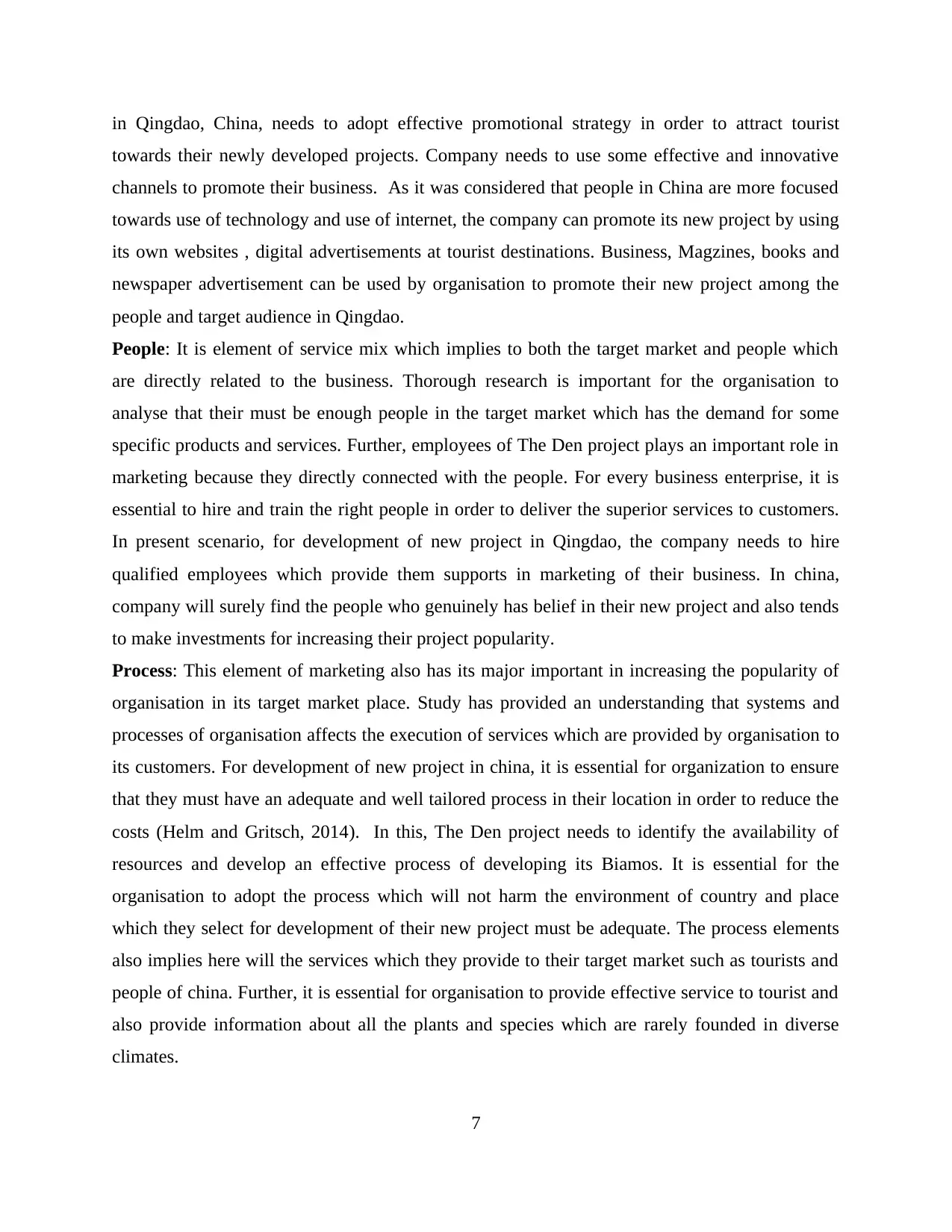
in Qingdao, China, needs to adopt effective promotional strategy in order to attract tourist
towards their newly developed projects. Company needs to use some effective and innovative
channels to promote their business. As it was considered that people in China are more focused
towards use of technology and use of internet, the company can promote its new project by using
its own websites , digital advertisements at tourist destinations. Business, Magzines, books and
newspaper advertisement can be used by organisation to promote their new project among the
people and target audience in Qingdao.
People: It is element of service mix which implies to both the target market and people which
are directly related to the business. Thorough research is important for the organisation to
analyse that their must be enough people in the target market which has the demand for some
specific products and services. Further, employees of The Den project plays an important role in
marketing because they directly connected with the people. For every business enterprise, it is
essential to hire and train the right people in order to deliver the superior services to customers.
In present scenario, for development of new project in Qingdao, the company needs to hire
qualified employees which provide them supports in marketing of their business. In china,
company will surely find the people who genuinely has belief in their new project and also tends
to make investments for increasing their project popularity.
Process: This element of marketing also has its major important in increasing the popularity of
organisation in its target market place. Study has provided an understanding that systems and
processes of organisation affects the execution of services which are provided by organisation to
its customers. For development of new project in china, it is essential for organization to ensure
that they must have an adequate and well tailored process in their location in order to reduce the
costs (Helm and Gritsch, 2014). In this, The Den project needs to identify the availability of
resources and develop an effective process of developing its Biamos. It is essential for the
organisation to adopt the process which will not harm the environment of country and place
which they select for development of their new project must be adequate. The process elements
also implies here will the services which they provide to their target market such as tourists and
people of china. Further, it is essential for organisation to provide effective service to tourist and
also provide information about all the plants and species which are rarely founded in diverse
climates.
7
towards their newly developed projects. Company needs to use some effective and innovative
channels to promote their business. As it was considered that people in China are more focused
towards use of technology and use of internet, the company can promote its new project by using
its own websites , digital advertisements at tourist destinations. Business, Magzines, books and
newspaper advertisement can be used by organisation to promote their new project among the
people and target audience in Qingdao.
People: It is element of service mix which implies to both the target market and people which
are directly related to the business. Thorough research is important for the organisation to
analyse that their must be enough people in the target market which has the demand for some
specific products and services. Further, employees of The Den project plays an important role in
marketing because they directly connected with the people. For every business enterprise, it is
essential to hire and train the right people in order to deliver the superior services to customers.
In present scenario, for development of new project in Qingdao, the company needs to hire
qualified employees which provide them supports in marketing of their business. In china,
company will surely find the people who genuinely has belief in their new project and also tends
to make investments for increasing their project popularity.
Process: This element of marketing also has its major important in increasing the popularity of
organisation in its target market place. Study has provided an understanding that systems and
processes of organisation affects the execution of services which are provided by organisation to
its customers. For development of new project in china, it is essential for organization to ensure
that they must have an adequate and well tailored process in their location in order to reduce the
costs (Helm and Gritsch, 2014). In this, The Den project needs to identify the availability of
resources and develop an effective process of developing its Biamos. It is essential for the
organisation to adopt the process which will not harm the environment of country and place
which they select for development of their new project must be adequate. The process elements
also implies here will the services which they provide to their target market such as tourists and
people of china. Further, it is essential for organisation to provide effective service to tourist and
also provide information about all the plants and species which are rarely founded in diverse
climates.
7
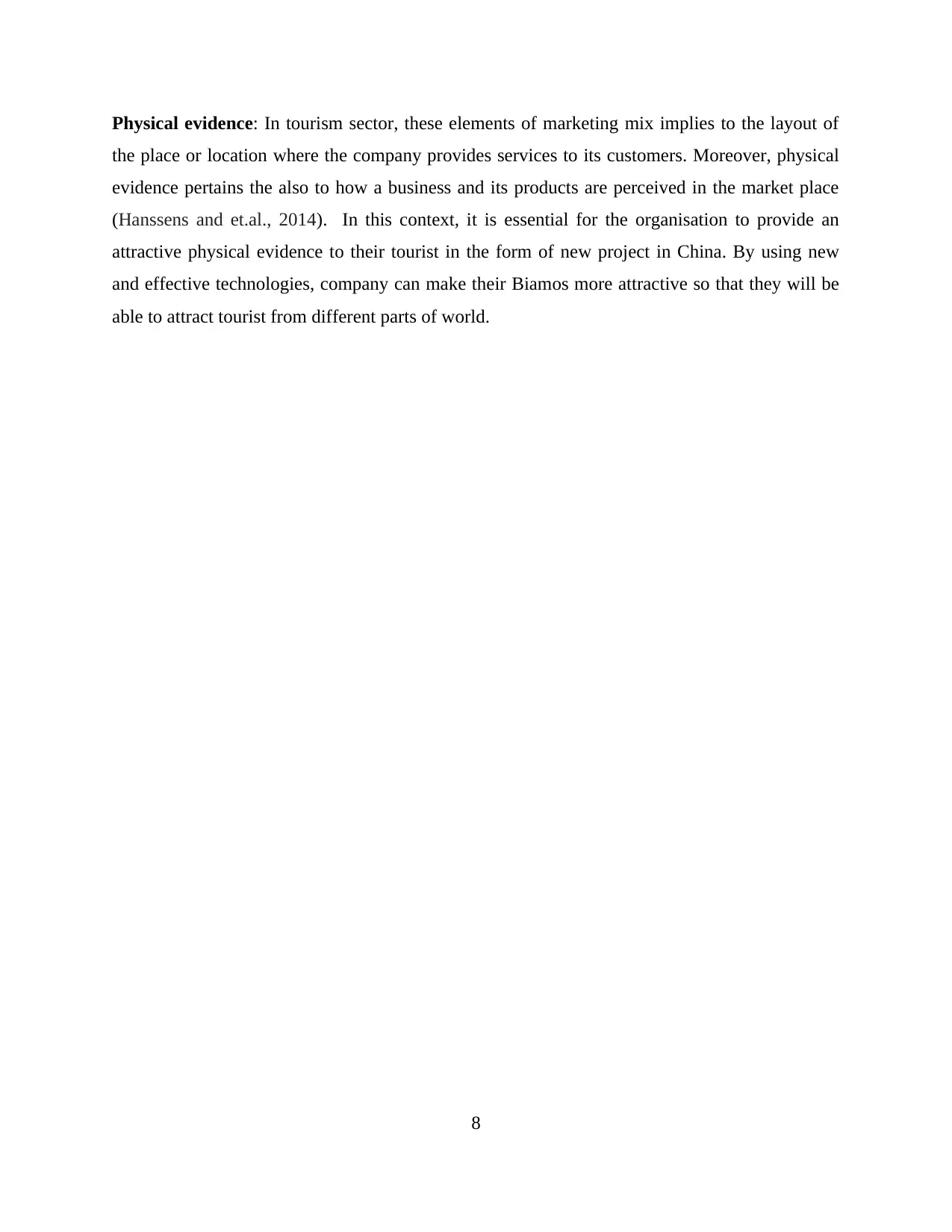
Physical evidence: In tourism sector, these elements of marketing mix implies to the layout of
the place or location where the company provides services to its customers. Moreover, physical
evidence pertains the also to how a business and its products are perceived in the market place
(Hanssens and et.al., 2014). In this context, it is essential for the organisation to provide an
attractive physical evidence to their tourist in the form of new project in China. By using new
and effective technologies, company can make their Biamos more attractive so that they will be
able to attract tourist from different parts of world.
8
the place or location where the company provides services to its customers. Moreover, physical
evidence pertains the also to how a business and its products are perceived in the market place
(Hanssens and et.al., 2014). In this context, it is essential for the organisation to provide an
attractive physical evidence to their tourist in the form of new project in China. By using new
and effective technologies, company can make their Biamos more attractive so that they will be
able to attract tourist from different parts of world.
8
⊘ This is a preview!⊘
Do you want full access?
Subscribe today to unlock all pages.

Trusted by 1+ million students worldwide
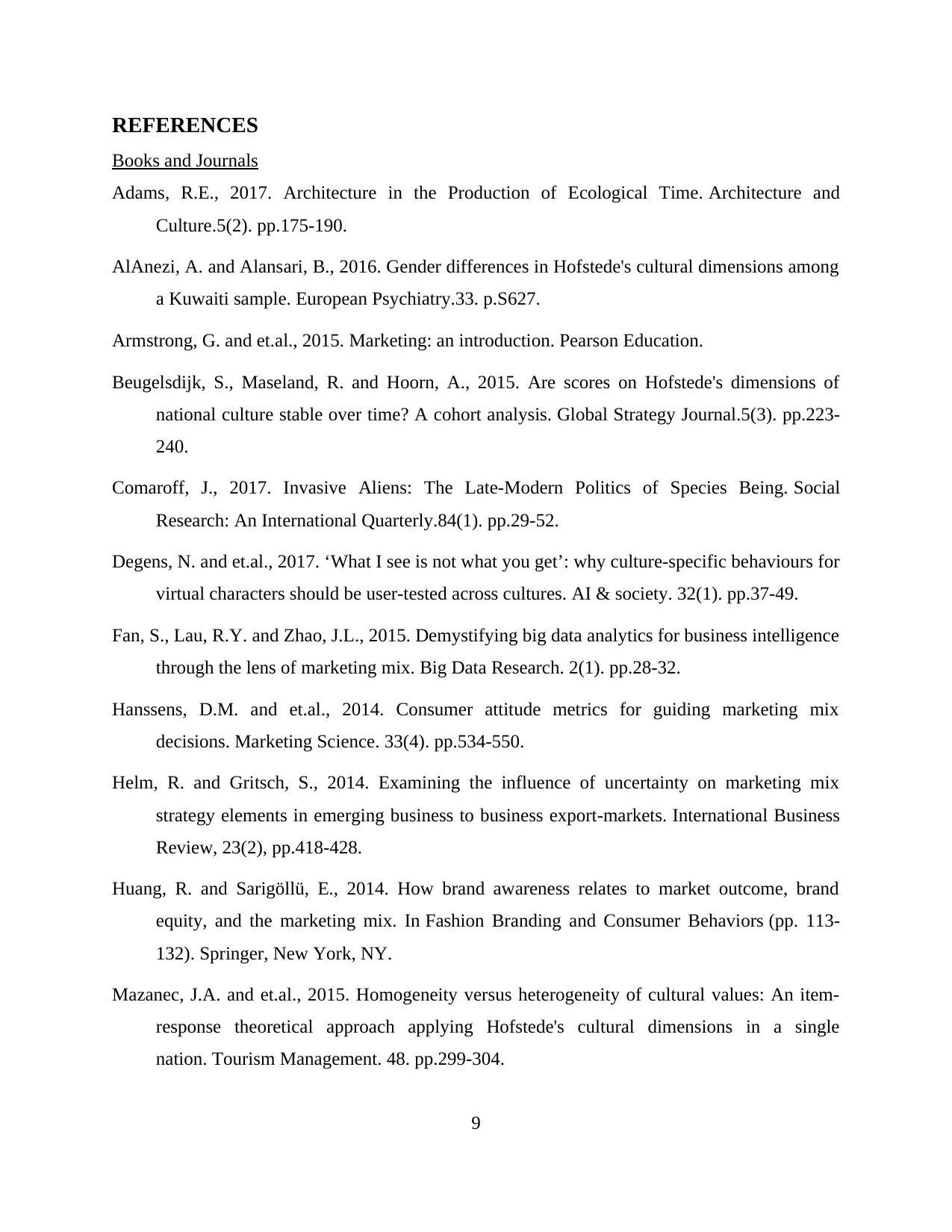
REFERENCES
Books and Journals
Adams, R.E., 2017. Architecture in the Production of Ecological Time. Architecture and
Culture.5(2). pp.175-190.
AlAnezi, A. and Alansari, B., 2016. Gender differences in Hofstede's cultural dimensions among
a Kuwaiti sample. European Psychiatry.33. p.S627.
Armstrong, G. and et.al., 2015. Marketing: an introduction. Pearson Education.
Beugelsdijk, S., Maseland, R. and Hoorn, A., 2015. Are scores on Hofstede's dimensions of
national culture stable over time? A cohort analysis. Global Strategy Journal.5(3). pp.223-
240.
Comaroff, J., 2017. Invasive Aliens: The Late-Modern Politics of Species Being. Social
Research: An International Quarterly.84(1). pp.29-52.
Degens, N. and et.al., 2017. ‘What I see is not what you get’: why culture-specific behaviours for
virtual characters should be user-tested across cultures. AI & society. 32(1). pp.37-49.
Fan, S., Lau, R.Y. and Zhao, J.L., 2015. Demystifying big data analytics for business intelligence
through the lens of marketing mix. Big Data Research. 2(1). pp.28-32.
Hanssens, D.M. and et.al., 2014. Consumer attitude metrics for guiding marketing mix
decisions. Marketing Science. 33(4). pp.534-550.
Helm, R. and Gritsch, S., 2014. Examining the influence of uncertainty on marketing mix
strategy elements in emerging business to business export-markets. International Business
Review, 23(2), pp.418-428.
Huang, R. and Sarigöllü, E., 2014. How brand awareness relates to market outcome, brand
equity, and the marketing mix. In Fashion Branding and Consumer Behaviors (pp. 113-
132). Springer, New York, NY.
Mazanec, J.A. and et.al., 2015. Homogeneity versus heterogeneity of cultural values: An item-
response theoretical approach applying Hofstede's cultural dimensions in a single
nation. Tourism Management. 48. pp.299-304.
9
Books and Journals
Adams, R.E., 2017. Architecture in the Production of Ecological Time. Architecture and
Culture.5(2). pp.175-190.
AlAnezi, A. and Alansari, B., 2016. Gender differences in Hofstede's cultural dimensions among
a Kuwaiti sample. European Psychiatry.33. p.S627.
Armstrong, G. and et.al., 2015. Marketing: an introduction. Pearson Education.
Beugelsdijk, S., Maseland, R. and Hoorn, A., 2015. Are scores on Hofstede's dimensions of
national culture stable over time? A cohort analysis. Global Strategy Journal.5(3). pp.223-
240.
Comaroff, J., 2017. Invasive Aliens: The Late-Modern Politics of Species Being. Social
Research: An International Quarterly.84(1). pp.29-52.
Degens, N. and et.al., 2017. ‘What I see is not what you get’: why culture-specific behaviours for
virtual characters should be user-tested across cultures. AI & society. 32(1). pp.37-49.
Fan, S., Lau, R.Y. and Zhao, J.L., 2015. Demystifying big data analytics for business intelligence
through the lens of marketing mix. Big Data Research. 2(1). pp.28-32.
Hanssens, D.M. and et.al., 2014. Consumer attitude metrics for guiding marketing mix
decisions. Marketing Science. 33(4). pp.534-550.
Helm, R. and Gritsch, S., 2014. Examining the influence of uncertainty on marketing mix
strategy elements in emerging business to business export-markets. International Business
Review, 23(2), pp.418-428.
Huang, R. and Sarigöllü, E., 2014. How brand awareness relates to market outcome, brand
equity, and the marketing mix. In Fashion Branding and Consumer Behaviors (pp. 113-
132). Springer, New York, NY.
Mazanec, J.A. and et.al., 2015. Homogeneity versus heterogeneity of cultural values: An item-
response theoretical approach applying Hofstede's cultural dimensions in a single
nation. Tourism Management. 48. pp.299-304.
9
Paraphrase This Document
Need a fresh take? Get an instant paraphrase of this document with our AI Paraphraser
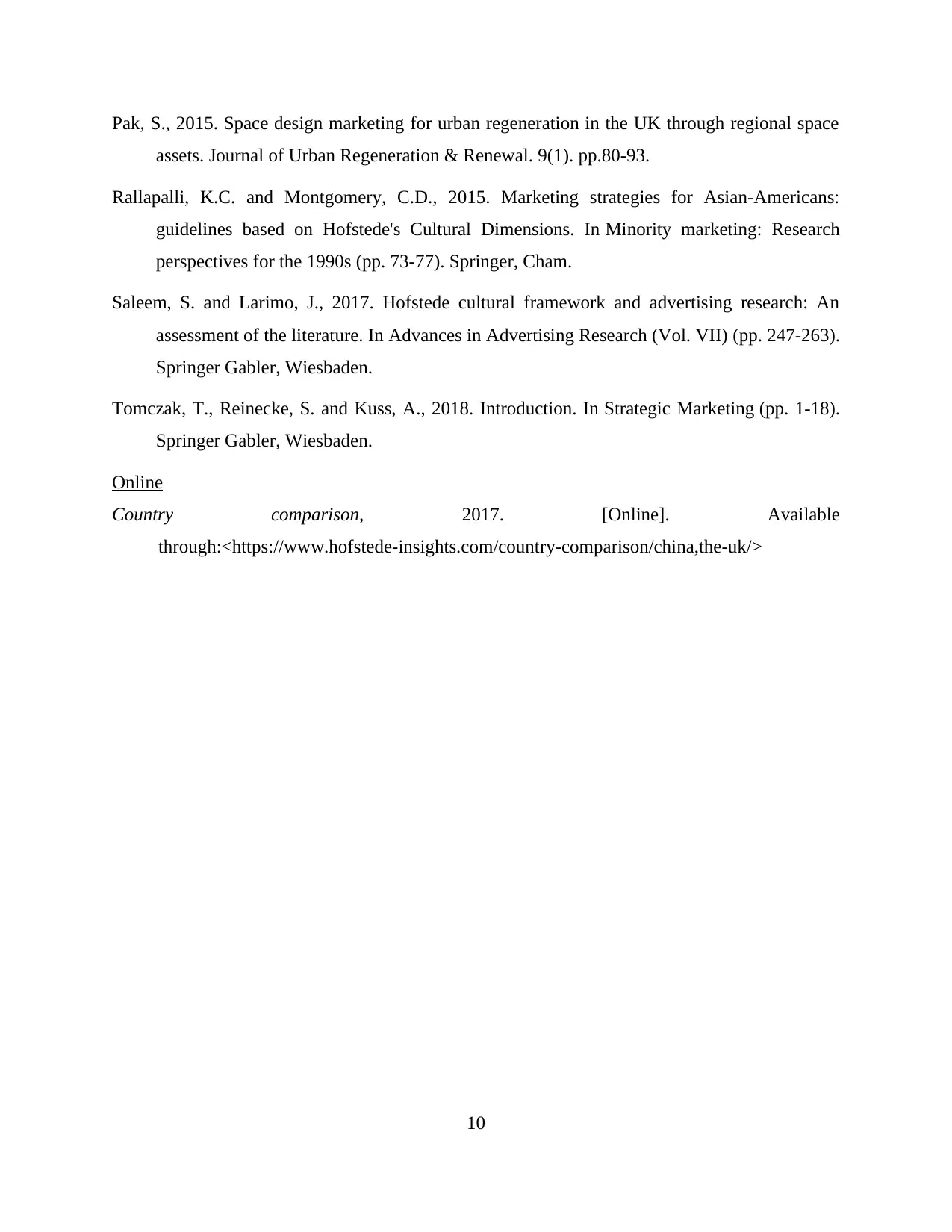
Pak, S., 2015. Space design marketing for urban regeneration in the UK through regional space
assets. Journal of Urban Regeneration & Renewal. 9(1). pp.80-93.
Rallapalli, K.C. and Montgomery, C.D., 2015. Marketing strategies for Asian-Americans:
guidelines based on Hofstede's Cultural Dimensions. In Minority marketing: Research
perspectives for the 1990s (pp. 73-77). Springer, Cham.
Saleem, S. and Larimo, J., 2017. Hofstede cultural framework and advertising research: An
assessment of the literature. In Advances in Advertising Research (Vol. VII) (pp. 247-263).
Springer Gabler, Wiesbaden.
Tomczak, T., Reinecke, S. and Kuss, A., 2018. Introduction. In Strategic Marketing (pp. 1-18).
Springer Gabler, Wiesbaden.
Online
Country comparison, 2017. [Online]. Available
through:<https://www.hofstede-insights.com/country-comparison/china,the-uk/>
10
assets. Journal of Urban Regeneration & Renewal. 9(1). pp.80-93.
Rallapalli, K.C. and Montgomery, C.D., 2015. Marketing strategies for Asian-Americans:
guidelines based on Hofstede's Cultural Dimensions. In Minority marketing: Research
perspectives for the 1990s (pp. 73-77). Springer, Cham.
Saleem, S. and Larimo, J., 2017. Hofstede cultural framework and advertising research: An
assessment of the literature. In Advances in Advertising Research (Vol. VII) (pp. 247-263).
Springer Gabler, Wiesbaden.
Tomczak, T., Reinecke, S. and Kuss, A., 2018. Introduction. In Strategic Marketing (pp. 1-18).
Springer Gabler, Wiesbaden.
Online
Country comparison, 2017. [Online]. Available
through:<https://www.hofstede-insights.com/country-comparison/china,the-uk/>
10
1 out of 11
Related Documents
Your All-in-One AI-Powered Toolkit for Academic Success.
+13062052269
info@desklib.com
Available 24*7 on WhatsApp / Email
![[object Object]](/_next/static/media/star-bottom.7253800d.svg)
Unlock your academic potential
Copyright © 2020–2026 A2Z Services. All Rights Reserved. Developed and managed by ZUCOL.





